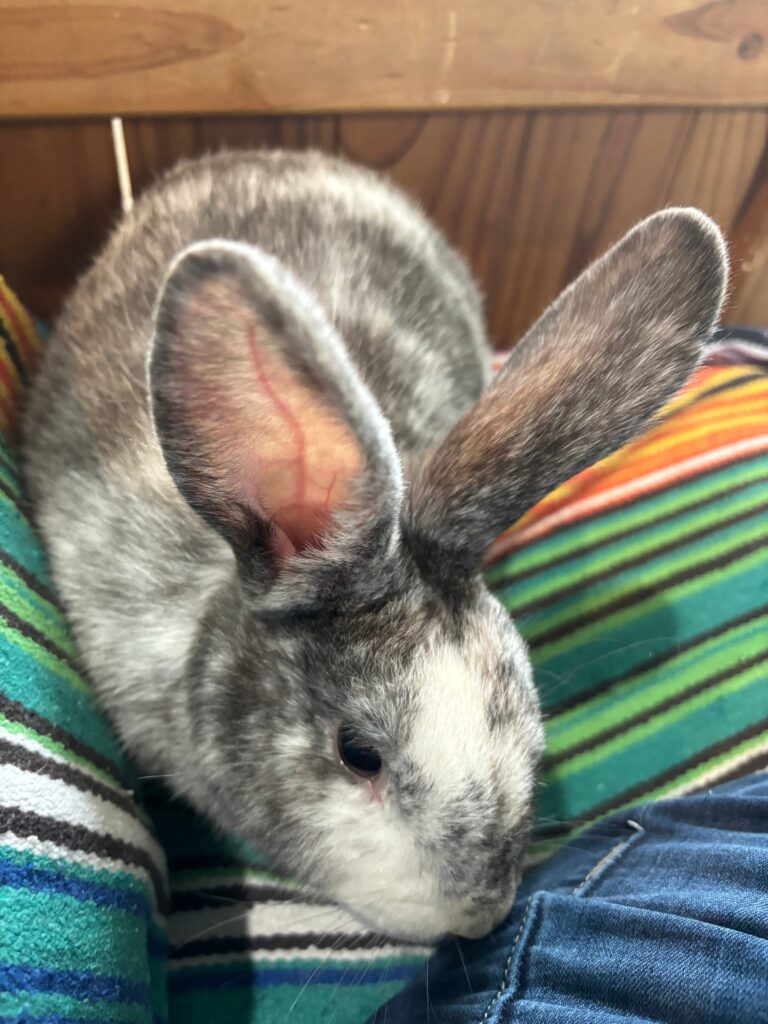
As I held the furry gray and white body against my chest, a sense of warmth moved through me. This rabbit had been abandoned in the streets of Washington DC, sitting in her cage for God knows how long before being rescued. And yet she let me pick her up. She could have scratched or bitten me, but she just wanted to be held closely, with love. The fact that she felt safe around me was an honor.
While most of us have never been abandoned as completely as she was, we’ve all be hurt by people in some way or another. Yet like her, we need to rely on others.
This reliance on and simultaneous care for others is the core of relationships and communities. As one of my favorite bands, The Decemberists, sings, “We are all of our hands and holders.”
This interdependence is one of the things that has become so much more obvious to me since becoming a parent. Modern parents talk a lot about how it takes a village to raise a child but where the hell is the village? We’re fortunate in so many ways – that my parents only live an hour away, that I make enough money that my husband could stay home for nine years and now works part-time, an old-fashioned neighborhood where kids can roam and loads of parks, a supportive church community – and even with all that, we’ve felt that lack. We’ve felt it on the long nights when our kids were babies and woke up a million times and now when they can’t fall asleep. When we’re both on the verge of burnout and we desperately need a long break but just can’t take one. When we’ve had to leave the dishes undone because we’re falling asleep on our feet. I’ve also noticed it when we have been able to rely on that village. When my parents have taken the kids for a weekend so we can get away or the many overnights the kids had with them during the first summer of COVID. (Thanks Mom and Dad!) When we can be there for friends when tragedy has struck their family or they need a kid-free night. When I could share my struggles with our church and recieve emotional support. Before I became a parent, the need to rely on others seemed a bit abstract. Now, it’s made concrete every single day.
Perhaps unsurprisingly, these experiences have influenced my parenting philosophy. Most people say they want to teach their children to be independent, but I don’t. As parenting writer Cindy Wang Brandt says, I want to teach and give them autonomy and interdependence. True full independence means never relying on anyone for anything ever. For one thing, it’s impossible. We rely on others to grow food, make our clothes, maintain roads and sidewalks and on and on. Thoreau, the patron saint of self-determination, could only go chill by himself at Walden Pond because he brought his laundry home to his mom. (He was kind of a jackass.) Everything in nature depends on the organisms around it.
Even if you could, trying to go it alone is harmful to yourself and others. If you try to solve the problems of the world yourself, you burn out and drop the obligations that others rely on you for. Or you slip into saviourism, believing you’re the only person who can do the task and rejecting anyone else’s input or perspective. (I’ve learned a lot of this from Black feminism writers like bell hooks and disability justice leaders.) I want to teach my kids to accept help when needed and give it in return. I want them to stand up for what’s right in collaboration and relationship with others.
Now, like everything in parenting, it’s a lot easier to say all that than model it! But I’ve tried to be purposeful about that too. When it’s time to do chores as a family, I talk about how we all have to contribute to the functioning of the household. My husband and I tell them about how each of us take responsibility for different aspects of cleaning and cooking, trading off to the other when needed. We listen and contribute to the Prayers of the People time at church. We give to mutual aid and accept gifts from others with grace. Often, it’s in the small actions – holding a space for a stranger who has to leave to find a friend, saying thank you to those who rarely get it, accepting assistance when we’re carrying too much.
Sometimes it’s also in freeing ourselves from guilt about relying on others. A few weeks ago, I led a community bike ride and my older son came with me. At the beginning of the ride, the leader gives a brief safety talk. As I only lead these rides a couple times a year, I always forget a detail or two. In the past, I had felt embarrassed and frustrated, beating myself up about forgetting something so simple. But this time, I didn’t. I asked the sweep of the group and other supporters to fill in what I missed. It was okay that I forgot because they were there to support me. I didn’t need to be perfect because other people could fill in the gaps.
After all, even when work is welcomed and enjoyed, it can still be tiring. At the rabbit rescue, I handed off the rabbit to my older son to cuddle. I wanted to get up and we had cages to clean. He settled down on the couch with her, happily ready to pick up where I left off.